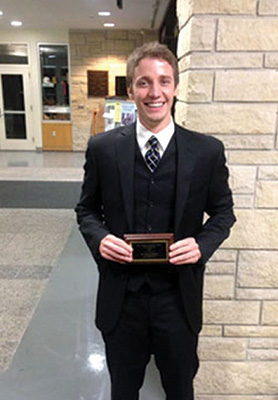Van Oss Writes about Wheaton Case for Harvard Law Review
By Catherine Elvy, Staff Writer Religious liberties are woven into the fabric of the United States.
Religious liberties are woven into the fabric of the United States.With deep admiration for that principle, a Harvard Law School student addressed concerns over the status of such freedoms when he penned an article for the Harvard Law Review exploring some of the key issues in the recent Wheaton College v. Burwell case.
Given his concerns for government interference in the operations of faith-based entities, Trenton Van Oss took on the complex topic for an article that appeared in January.
The Wheaton alumnus of 2013 is an active participant in Christian Union's ministry at Harvard Law School. Through the ministry, the Pennsylvania native receives mentoring to help him prepare to reflect his faith in future endeavors.
"Christian Union has helped teach me to prioritize the Lord and my spiritual relationship in the midst of all the noise and distractions that come with law school," said Van Oss, who recently finished his second year at Harvard Law School. "We talk a lot about how not to lose yourself to the common traps in the legal profession – careerism, chasing prestige, and putting your spiritual life on the back burner when life gets busy."
During meetings, the ministry's faculty members "help us to recharge spiritually," he said.
"It's impossible to reflect Christ at work if you're not devoting time and attention to Him in private."
As a Christian student, Van Oss is exercising leadership by displaying concerns for challenges to religious freedoms across the country.
"This pits the government's interpretation of religious doctrine against religious adherents' [views]. The central question is about who gets to decide what religious doctrine requires," he said.
Specifically, Van Oss probed some of the implications of a ruling by the U.S. Court of Appeals for the Seventh Circuit against Wheaton College, in particular whether the contraceptive requirements of the government's healthcare initiative pose a substantial burden to the Christian college.
In July 2015, the Chicago-based court held that compromise regulations allowing Wheaton to opt to turn over the fulfillment of contraceptive requirements to a third party do not meaningfully burden the institution's religious exercise.
That's not so, according to Van Oss. "The government says, 'We're not requiring you do anything against your faith,'" Van Oss said. "Wheaton says, 'Yes, you are.'"
At issue, under the Patient Protection and Affordable Care Act, employers must provide health insurance policies that cover specific contraceptives. Given outcries, government administrators crafted a compromise for religious organizations, hospitals, and colleges, essentially allowing them to "self-certify" their objections to their insurance carriers.
Under such an arrangement, the groups submit an Employee Benefits Security Administration Form 700 to register religious objections, thus enabling insurers or third-party administrators to assume the responsibility of paying for birth control.
However, some organizations, including Wheaton, countered that signing the form authorizing the third parties to provide contraceptive coverage made them complicit in acts that grossly violated their beliefs. Some Christians oppose forms of birth control that prevent human embryos from implanting, a practice they equate to abortion.
Consequently, Wheaton sought relief via a federal lawsuit in 2013. Van Oss' analysis for Harvard Law Review focused on the strongly worded appellate ruling.
In July 2015, the Seventh Circuit asserted the regulations excusing Wheaton from directly providing contraceptives, including the option to simply draft a letter to the government, did not substantially burden the college's religious exercise. "This is hardly a burdensome requirement," wrote Chief Judge Richard Posner, Yale '59, Harvard Law '62.
Essentially, the court found Wheaton to be incorrect in asserting the act of notifying the government of its objections made it the "trigger-puller or facilitator" of actually extending emergency contraceptives to its staff via a third party.
Van Oss noted the opinion from the Appeals Court allowed judicial scrutiny to improperly play a role in determining questions of "creed and conscience."
As a devoutly Christian college, Wheaton states its members must "uphold the God-given worth of human beings, from conception to death, as the unique image-bearers of God," Van Oss wrote.
That belief forbids the school from designating others to pay for the grave evil of abortion.
In its lawsuit, the college argued the contraceptive regulations in the healthcare act violated the Religious Freedom Restoration Act, which requires the government to justify any law that substantially burdens religious exercise as the least restrictive means of achieving a compelling governmental interest.
A district court later ruled against the college, determining that the health law – not the organization's act of signing and mailing the form – served as the true causal mechanism of triggering contraceptive services. The appeals court agreed.
However, in a separate case in 2014, the U.S. Supreme Court decided 5-4 that the Affordable Care Act's contraceptive requirements violated the religious freedom act for closely held corporations. It noted it was inappropriate for the court to decide whether the religious beliefs of the operators of the Hobby Lobby chain were mistaken or insubstantial.
As for the Wheaton case, the Seventh Circuit's decision marked an intrusion, Van Oss noted.
"Questions about the limits of complicity are better left to philosophers and theologians than to federal judges," Van Oss wrote.
Read the article here >





